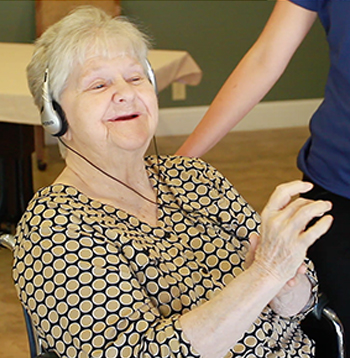In the most comprehensive study of its kind on the effects of the Music & Memory program, researchers from the Betty Irene Moore School of Nursing at UC Davis found personalized music reduces the amount of medication taken by nursing home residents and lessens their aggressive behaviors. The results were published today in the Journal for Post-acute and Long-term Care Medicine (JAMDA).
 Ruth Roenspie was one of more than 4,000 residents in long-term care facilities in California who used the Music & Memory program.
Ruth Roenspie was one of more than 4,000 residents in long-term care facilities in California who used the Music & Memory program.
A three-year study of 4,107 residents in 265 California nursing homes found the use of antipsychotic drugs declined by 13% and anti-anxiety medications declined by 17% each quarter for residents with dementia using the music program. The odds of depressive symptoms decreased 16% per quarter and the odds of reported pain decreased 17% per quarter. In addition, the number of days on medications declined by 30% and aggressive behaviors reduced by 20%.
"Our analyses are promising in several areas, particularly in reduction of psychotropic medications, improving mood and behaviors," said Deb Bakerjian, a clinical professor at the School of Nursing and principal investigator of the study. "Based on these results, if I were to talk to a family member of a person with dementia, I'd tell them to get a personal music device, put together a playlist and work with the nursing home team to ensure your loved one utilized personal music to enhance their quality of life."
Bakerjian collaborated with the California Association of Health Facilities (CAHF) on the $1.4 million quality improvement initiative aimed at improving dementia care in skilled nursing facilities. Researchers used the music program founded by Dan Cohen as a nonpharmacological intervention. The program trains nursing home staff and other healthcare professionals who care for older adults, as well as family caregivers, how to create and provide personalized playlists using iPods/MP3 Players and related digital audio systems that enable those struggling with Alzheimer's, dementia and other cognitive and physical challenges to reconnect with the world through music-triggered memories. On average, residents listened to their playlists two to three times a week for two hours or less each time.
"The results of the study are meaningful and encouraging for our residents and their families," said DeAnn Walters, CAHF's director of Clinical Affairs and Quality Improvement. "In addition, the power of personalized music gives our dedicated caregivers another important resource as they work to comfort and engage residents with dementia and other cognitive disorders."
Several staff indicated that the program had a calming effect and that residents were often happier, more alert, less agitated and more able to communicate. A nursing home administrator stated, "[Staff] can see that they're not acting out as much. Or they seem more coherent in their conversations. The staff can see that it's working…our residents are singing along with the music."
At the conclusion of the study, Bakerjian issued a final recommendation that nursing homes be incentivized in some way to adopt the Music & Memory program with guidance that all residents with dementia and/or behavior or mood issues be given the opportunity to try a personalized music program as a non-pharmacological intervention.
"Music is deeply embedded in our minds, lodged in our hearts, woven into our lives and experiences. Even when we no longer have words or physical power, music is still a language we recognize, still a key to life," said Joe Schick, the program's executive director. "Music & Memory cherishes and helps to preserve the connective threads of everyone's individual musical identity and the beautiful light of memory it evokes."
In addition to medication and behavior, researchers tested a UC Davis designed Quality Assurance Performance Improvement (QAPI) tool to support implementation of the program. QAPI is essentially a roadmap developed by the Centers for Medicaid & Medicare Services required by nursing homes to improve the quality of life, care and services for residents. Researchers also studied the organizational factors in the success or failure of the adoption and sustainment of the program in participating facilities.
"A tailored QAPI guide was found to be very helpful, particularly for the lower performing facilities that often struggle with quality of care and overall quality measures," Bakerjian said. "Further consideration might be for the Quality Improvement Organizations to work on tailored QAPI guides for nursing homes with poor outcomes."
Bakerjian said since California is a microcosm of the rest of the nation in terms of diversity, its population of older adults and the number of nursing homes that operate throughout the state, that the results from this study can have significant impact on every other state in the country.
This study advances the ongoing work of the Family Caregiving Institute at the Betty Irene Moore School of Nursing. Director Terri Harvath said "a caregivers' role does not stop once a family member moves to a long-term care facility." Through provider and caregiver education, along with research for best practices and methods to assist this invisible workforce, institute researchers work to support the millions of individuals who provide care to aging family members or friends.
The Betty Irene Moore School of Nursing advances health and ignites leadership through innovative education, transformative research and bold system change. CAHF is a professional association representing nursing homes.






